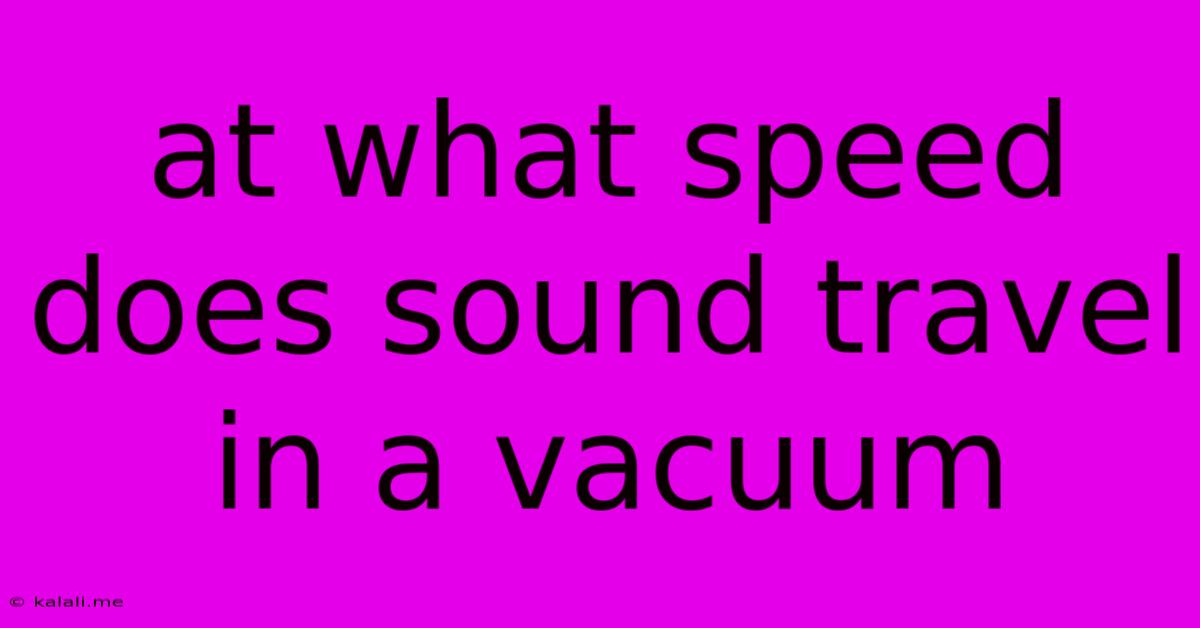At What Speed Does Sound Travel In A Vacuum
Kalali
Jun 15, 2025 · 3 min read

Table of Contents
At What Speed Does Sound Travel in a Vacuum? The Answer Might Surprise You
Meta Description: Discover the surprising answer to the question: how fast does sound travel in a vacuum? We explore the nature of sound waves and why a vacuum presents a unique challenge to sound propagation.
Sound is a fascinating phenomenon, a form of energy that travels as waves, causing vibrations that we perceive as noise, music, or even speech. But have you ever wondered how these waves behave in different environments? One particularly interesting question is: at what speed does sound travel in a vacuum? The short answer is: sound cannot travel in a vacuum.
This seemingly simple answer hides a deeper understanding of the nature of sound itself. To understand why, let's delve into how sound waves actually work.
Understanding Sound Wave Propagation
Sound waves are mechanical waves, meaning they require a medium to propagate. This medium can be a solid, liquid, or gas. The wave consists of compressions and rarefactions of the particles within the medium. As a sound source vibrates, it pushes on the nearby particles, causing them to bump into their neighbors, transferring the energy outwards. This chain reaction creates the sound wave that travels through the medium.
Think of dropping a pebble into a still pond. The ripple effect you see is analogous to a sound wave spreading out. The water acts as the medium, transmitting the energy from the point of impact outwards. Without the water, there's no ripple; similarly, without a medium, there's no sound wave.
Why Vacuum Prevents Sound Transmission
A vacuum, by definition, is a space completely devoid of matter. There are no particles – no atoms or molecules – to vibrate and transfer the energy of the sound wave. Without a medium to carry the vibrations, the sound wave simply cannot exist. This is why astronauts on the moon, which has effectively no atmosphere, need communication systems that don't rely on sound transmission. They rely on radio waves, which are electromagnetic waves and can travel through a vacuum.
Comparing Sound Speed in Different Media
While sound can't travel in a vacuum, its speed varies significantly depending on the medium. Generally:
- Solids: Sound travels fastest in solids because the particles are tightly packed, allowing for efficient energy transfer. Steel, for example, is a very good conductor of sound.
- Liquids: Sound travels slower in liquids than in solids due to the greater distance between particles.
- Gases: Sound travels slowest in gases because the particles are widely spaced and less effectively transfer energy. The speed of sound in air also varies with temperature and pressure.
The Speed of Sound in Air (Not a Vacuum!)
To further clarify, while the article focuses on the absence of sound in a vacuum, let's briefly mention the speed of sound in air: Approximately 343 meters per second (767 miles per hour) at 20°C (68°F). This speed changes with temperature – it increases as temperature increases.
In conclusion, the speed of sound in a vacuum is zero because sound cannot propagate in the absence of a medium. Understanding this fundamental principle highlights the crucial role of matter in sound transmission and helps us appreciate the diverse ways sound behaves in different environments.
Latest Posts
Latest Posts
-
Which Of The Following Statements About The Mean Are True
Jun 16, 2025
-
What Is The Difference Between Electron Affinity And Electronegativity
Jun 16, 2025
-
Formal Charge Of P In Po43
Jun 16, 2025
-
Which Of The Following Is Not A Mixture
Jun 16, 2025
-
Case Western Reserve University Sat Requirements
Jun 16, 2025
Related Post
Thank you for visiting our website which covers about At What Speed Does Sound Travel In A Vacuum . We hope the information provided has been useful to you. Feel free to contact us if you have any questions or need further assistance. See you next time and don't miss to bookmark.